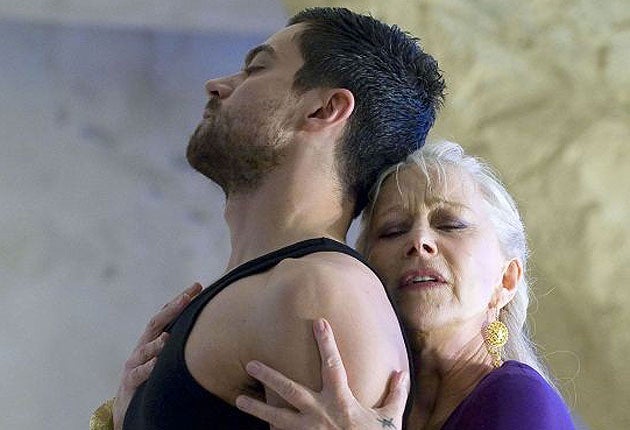First Night: Phedre, National Theatre, London
Mirren's purple patch comes to an end

Since she last appeared at the National Theatre six years ago, Helen Mirren has become a dame and played the Queen. So she's no stranger to the purple in Jean Racine's great classical 17th century tragedy about a dysfunctional royal expiring with incestuous love for her stepson.
She wears a lot of purple, in fact, drifting onto the museum-like, pock-marked palace in Troezen, in the Peloponnese, in a full set of mauve veils, tugging at her jewellery and tearing at her own terrible obsession. Phedre is descended from the Sun, and Mirren, the ultimate page three girl, is a randy old ray, even if she looks more like a Nordic Brunhilde in her flaxen wig.
For this is a very sedate version of a passionate tragedy. It plays for two uninterrupted hours and feels like something devised for tourists sampling culture on the South Bank. It has nothing much to do with Racine. Ted Hughes's supple text is a fair stab, but a wrong one.
You simply don't get the tragic tread of the French alexandrines in a bolshie arrangement of free verse with the odd iambic pentameter thrown in. And there's no formal rhyming, essential to the meaning in Racine, so you're left with a po-faced series of encounters between rather boring people.
At least Dominic Cooper as Hippolytus has a bit more to do than when he last knocked around the Mediterranean in the film of Mamma Mia!. And he's very good. Everyone's very good. They're just all acting in something very bad, a thoroughly traduced and reverentially presented "classic".
The acting is bloodless, all the gore used up on plastering the costumes late in the day. Phedre is supposed to be consumed by her own sunshine. Instead, Mirren opts for decorous restraint, as if suggesting that passion is best implied not spoken. That's simply not what happens in Racine, and it's so disastrous a misunderstanding that you begin to wonder if Hytner is still fully in control of his faculties, let alone the National Theatre.
There are one or two admirable performers such as Wendy Morgan as Panope and Chipo Chung as Aricia's attendant. Aricia, Racine's great invention in the myth, the political prisoner with whom Hippolytus has fallen in love, is well done by Ruth Negga. And Phedre's husband, Theseus, first reported missing and then bullishly reincarnated, is given a lot of fizz and bottle by the Irish actor Stanley Townsend.
But you don't feel anyone's really sinking their teeth into anyone else, let alone Racine. Bob Crowley's design is a cunning architectural arrangement of walls and a ceiling, with a cerulean backdrop. It pokes you with its self-satisfied aesthetic beauty but it doesn't unleash the animal of art.
The best Phedre I've seen was Glenda Jackson's in a translation that at least attempted a metrical approximation of the text. I like Ted Hughes's version, but it's not Racine. Why shouldn't the National do a great play like this in its original language? And why should Mirren carry on as if she was in a great tragedy instead of actually doing one?
The old nurse, Oenone, is played by Margaret Tyzack as if entitled. When we are told that she's jumped off a cliff and killed herself, there's only one possible response. Oh, good... was she pushed? If not, she should have been.
Join our commenting forum
Join thought-provoking conversations, follow other Independent readers and see their replies
Comments
Bookmark popover
Removed from bookmarks